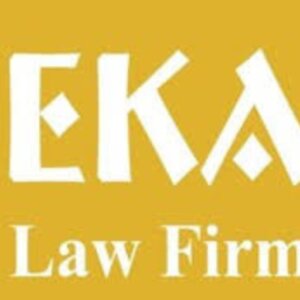Best Accounting & Auditing Lawyers in Indonesia
Share your needs with us, get contacted by law firms.
Free. Takes 2 min.
Or refine your search by selecting a city:
List of the best lawyers in Indonesia
About Accounting & Auditing Law in Indonesia
Accounting and auditing in Indonesia are governed by a framework of laws and regulations that ensure transparency, accountability, and compliance with both national and international standards. The financial reporting is primarily based on the Financial Accounting Standards (SAK), while auditing practices adhere to the Auditing Standards (SA). Regulated by the Indonesian Institute of Certified Public Accountants (IAPI) and supervised by the Financial Services Authority (OJK), these procedures ensure that business operations in Indonesia are conducted ethically and in compliance with accepted standards.
Why You May Need a Lawyer
There are several situations where you might require legal assistance in the field of accounting and auditing. Common scenarios include facing audits by government authorities, dealing with compliance issues, seeking advice on financial reporting standards, or navigating disputes over accounting practices. Businesses may also need legal help when drafting contracts that require clear financial stipulations or when they are subject to investigations by the Indonesian Financial Transaction Reports and Analysis Center (PPATK) for suspected money laundering activities.
Local Laws Overview
The accounting and auditing landscape in Indonesia is primarily influenced by the Law No. 40 of 2007 concerning Limited Liability Companies, the Law No. 8 of 1995 on Capital Markets, and other regulations issued by the OJK. These laws set the standards for financial disclosures, auditing requirements, and practices. Additionally, the Indonesian Financial Accounting Standards Board (DSAK) regularly revises the SAK to align with International Financial Reporting Standards (IFRS), ensuring relevance and accuracy in financial reporting.
Frequently Asked Questions
What are the primary accounting standards in Indonesia?
The primary accounting standards in Indonesia are the Indonesian Financial Accounting Standards (SAK). These standards align closely with International Financial Reporting Standards (IFRS).
Who regulates auditing standards in Indonesia?
The Indonesian Institute of Certified Public Accountants (IAPI) regulates auditing standards, which professional auditors must follow to ensure compliance and quality in their audit engagements.
Do Indonesian companies need to have financial statements audited?
Yes, most companies, especially those publicly listed or with significant business activities, are required by law to have their financial statements audited annually by certified public accountants.
What role does the Financial Services Authority (OJK) play?
The OJK supervises and regulates the financial services sector, including setting standards for transparency and accountability in financial reporting and auditing practices.
How can discrepancies in financial statements be legally addressed?
Discrepancies can be addressed by engaging a professional auditor or accountant to review the documents. Legal consultation may also be necessary if a dispute arises that requires mediation or arbitration.
Are there penalties for non-compliance with accounting regulations?
Yes, there are penalties, including fines and possible imprisonment, for non-compliance with accounting regulations and standards. The severity of the penalty depends on the nature and magnitude of the non-compliance.
Can foreign companies use their home country accounting standards in Indonesia?
No, foreign companies operating in Indonesia must prepare their financial statements in accordance with Indonesian Financial Accounting Standards (SAK), although certain alignments with IFRS are permissible.
How are ethical issues in auditing addressed?
Ethical issues are addressed through strict adherence to the professional code of ethics outlined by the IAPI and relevant legislation. Violations can lead to legal repercussions and revocation of practicing licenses.
What is the process for an audit in Indonesia?
The audit process involves planning, gathering evidence, evaluating controls, and testing transactions to ensure the accuracy and completeness of financial statements. The auditor then provides an opinion on the financial statements’ fairness.
Can disputes over audit findings be taken to court?
Yes, disputes over audit findings can be taken to court if they cannot be resolved through negotiation, mediation, or arbitration. Engaging a lawyer experienced in accounting litigation may be beneficial in these cases.
Additional Resources
Individuals can consult resources such as the Indonesian Institute of Accountants (IAI) and the OJK for guidance and updates on accounting practices. Moreover, the Indonesian Association of Public Accountants (IAPI) provides valuable information regarding auditing standards and practices. Government bodies like the Directorate General of Taxation (DJP) and Bank Indonesia can also offer insights and assistance.
Next Steps
If you require legal assistance in the field of accounting and auditing in Indonesia, it is advisable to consult a legal professional with expertise in financial regulations. Begin by researching reputable law firms or independent legal consultants who specialize in this area. Preparing relevant documents and clearly outlining your situation will enable them to provide you tailored advice. Engaging a licensed legal advisor can help navigate the complexities of Indonesian accounting and auditing laws effectively, ensuring compliance and safeguarding your interests.
Lawzana helps you find the best lawyers and law firms in Indonesia through a curated and pre-screened list of qualified legal professionals. Our platform offers rankings and detailed profiles of attorneys and law firms, allowing you to compare based on practice areas, including Accounting & Auditing, experience, and client feedback.
Each profile includes a description of the firm's areas of practice, client reviews, team members and partners, year of establishment, spoken languages, office locations, contact information, social media presence, and any published articles or resources. Most firms on our platform speak English and are experienced in both local and international legal matters.
Get a quote from top-rated law firms in Indonesia — quickly, securely, and without unnecessary hassle.
Disclaimer:
The information provided on this page is for general informational purposes only and does not constitute legal advice. While we strive to ensure the accuracy and relevance of the content, legal information may change over time, and interpretations of the law can vary. You should always consult with a qualified legal professional for advice specific to your situation.
We disclaim all liability for actions taken or not taken based on the content of this page. If you believe any information is incorrect or outdated, please contact us, and we will review and update it where appropriate.
Browse accounting & auditing law firms by city in Indonesia
Refine your search by selecting a city.

















